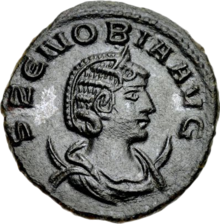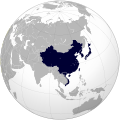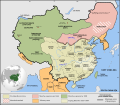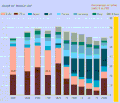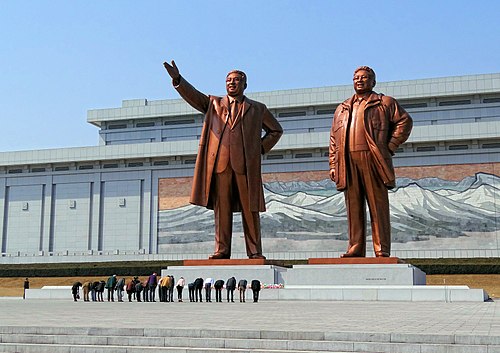
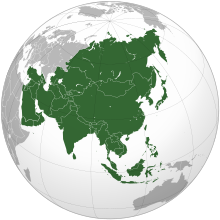 Asia (/ˈeɪʒə/ AY-zhə, UK also /ˈeɪʃə/ AY-shə) is the largest continent in the world by both land area and population. It covers an area of more than 44 million square kilometers, about 30% of Earth's total land area and 8% of Earth's total surface area. The continent, which has long been home to the majority of the human population, was the site of many of the first civilizations. Its 4.7 billion people constitute roughly 60% of the world's population. Asia shares the landmass of Eurasia with Europe, and of Afro-Eurasia with both Europe and Africa. In general terms, it is bounded on the east by the Pacific Ocean, on the south by the Indian Ocean, and on the north by the Arctic Ocean. The border of Asia with Europe is a historical and cultural construct, as there is no clear physical and geographical separation between them. A commonly accepted division places Asia to the east of the Suez Canal separating it from Africa; and to the east of the Turkish straits, the Ural Mountains and Ural River, and to the south of the Caucasus Mountains and the Caspian and Black seas, separating it from Europe. Since the concept of Asia derives from the term for the eastern region from a European perspective, Asia is the remaining vast area of Eurasia minus Europe. Therefore, Asia is a region where various independent cultures coexist rather than sharing a single culture, and the boundary between Europe is somewhat arbitrary and has moved since its first conception in classical antiquity. The division of Eurasia into two continents reflects East–West cultural differences, some of which vary on a spectrum. (Full article...) Featured articleUkiyo-e is a genre of Japanese art that flourished from the 17th through 19th centuries. Its artists produced woodblock prints and paintings of such subjects as female beauties; kabuki actors and sumo wrestlers; scenes from history and folk tales; travel scenes and landscapes; flora and fauna; and erotica. The term ukiyo-e (浮世絵) translates as 'picture[s] of the floating world'. In 1603, the city of Edo (Tokyo) became the seat of the ruling Tokugawa shogunate. The chōnin class (merchants, craftsmen and workers), positioned at the bottom of the social order, benefited the most from the city's rapid economic growth. They began to indulge in and patronize the entertainment of kabuki theatre, geisha, and courtesans of the pleasure districts. The term ukiyo ('floating world') came to describe this hedonistic lifestyle. Printed or painted ukiyo-e works were popular with the chōnin class, who had become wealthy enough to afford to decorate their homes with them. (Full article...) Selected Country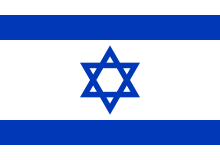 Israel, officially the State of Israel, is a country in the Southern Levant region of West Asia. It is bordered by Lebanon and Syria to the north, the West Bank and Jordan to the east, the Gaza Strip and Egypt to the southwest, and the Mediterranean Sea to the west. The country also has a small coastline on the Red Sea at its southernmost point, and part of the Dead Sea lies along its eastern border. Israel's proclaimed capital is in Jerusalem, while Tel Aviv is the country's largest urban area and economic center. Israel is located in a region known to Jews as the Land of Israel, synonymous with the Palestine region, the Holy Land, and Canaan. In antiquity, it was home to the Canaanite civilization followed by the kingdoms of Israel and Judah. Situated at a continental crossroad, the region experienced demographic changes under the rule of various empires from the Romans to the Ottomans. European antisemitism in the late 19th century galvanized Zionism, which sought a Jewish homeland in Palestine and gained British support. After World War I, Britain occupied the region and established Mandatory Palestine in 1920. Increased Jewish immigration in the leadup to the Holocaust and British colonial policy led to intercommunal conflict between Jews and Arabs, which escalated into a civil war in 1947 after the United Nations (UN) proposed partitioning the land between them. (Full article...) Featured biographySeptimia Zenobia (Palmyrene Aramaic: 𐡡𐡶𐡦𐡡𐡩, Bat-Zabbai; c. 240 – c. 274) was a third-century queen of the Palmyrene Empire in Syria. Many legends surround her ancestry; she was probably not a commoner and she married the ruler of the city, Odaenathus. Her husband became king in 260, elevating Palmyra to supreme power in the Near East by defeating the Sasanian Empire of Persia and stabilizing the Roman East. After Odaenathus' assassination, Zenobia became the regent of her son Vaballathus and held de facto power throughout his reign. In 270, Zenobia launched an invasion that brought most of the Roman East under her sway and culminated with the annexation of Egypt. By mid-271 her realm extended from Ancyra, central Anatolia, to Upper Egypt, although she remained nominally subordinate to Rome. However, in reaction to the campaign of the Roman emperor Aurelian in 272, Zenobia declared her son emperor and assumed the title of empress, thus declaring Palmyra's secession from Rome. The Romans were victorious after heavy fighting; the empress was besieged in her capital and captured by Aurelian, who exiled her to Rome, where she spent the remainder of her life. (Full article...) General imagesThe following are images from various Asia-related articles on Wikipedia. Featured pictureVisitors bowing in a show of respect for North Korean leaders Kim Il-sung and Kim Jong-il on Mansudae (Mansu Hill) in Pyongyang, North Korea.
Did you know...
Updated: 6:33, 14 February 2024 In the news
Related portalsMajor Religions in Asia Middle East Central Asia and Caucasus Indian Subcontinent Southeast Asia East Asia Selected panorama
The Central Area of Singapore surrounded by the perimeter of five planning areas: the Marina Bay, the Downtown Core, Marina East, Marina South and Straits View. The area surrounding the bay itself, also called Marina Bay, is a 360 hectare extension to the adjacent CBD. It is also the new downtown of Singapore built on reclaimed land. TopicsCategoriesAssociated WikimediaThe following Wikimedia Foundation sister projects provide more on this subject:
More portalsShortcuts to this page: Asia portal • P:ASIA Purge server cache |
